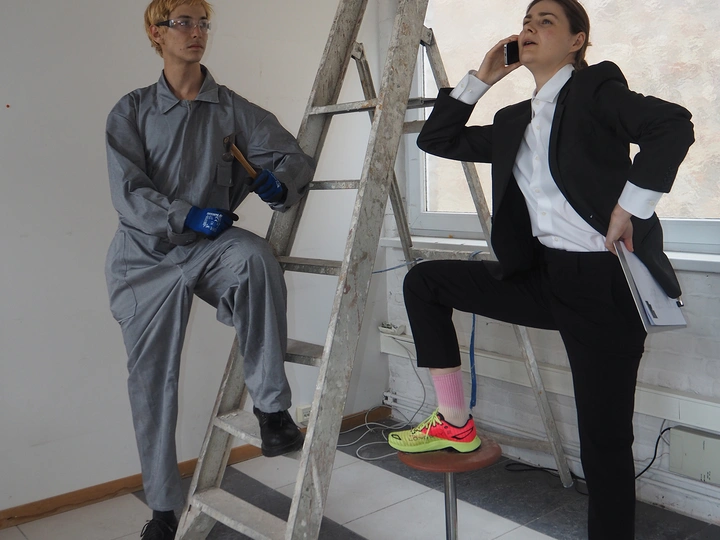Bureau des Réparations

Sophia Holst
Anton W.V. Ripon is a spatial designer, researcher and production specialist, graduated from *Ecole Duperré -FR* and from the *Design Academy of Eindhoven -NL*. He works within interior design, exhibition design, landscaping, teaching, publication and research. Recently based in Belgium, he is working with design collectives, artists and architects on a variety of small-scale projects. He worked with summerschools *provisional school for Nothing, hackers&designers, domaine de Boisbuchet*, design collectives: *Gilbard.es and Club Dérive*, private clients, writing contributions *the aquarium is a listening glass, revue cabane*, architecture *SKNYPL* and collectible design *studio dogtooth*.
Sophia Holst (1988) is a Dutch architect-researcher based in Brussels, active in the architectural fields of Belgium and the Netherlands. Through critical urban research, exhibitions and applied architectural projects, She both practices and reflects on the field of architecture and urban planning, intending to reveal ideological standpoints behind urban developments and architectural forms. She obtained a Master’s degree in Visual Arts at the Sandberg Instituut in Amsterdam and a Master in Architecture at the KU Leuven in Brussels. She collaborated with architecture offices like Studio Anne Holtrop (NL), Nu architectuuratelier (BE) and CRIT architects (BE). She completed her residency at the Jan van Eyck Academy in 2021 and received the Dutch Talent Development Grant from the Creative Industries Fund in 2023. With the support of the Flemish Kunstendreet, Holst currently works on the foundations of an independent architecture- and research practice, in which critical urban theory and applied design are interwoven.
Bureau des réparations is a hybrid architecture bureau rooted in both public and private affairs. It seeks direct connection with European residents of ill maintained modernist public/ social housing, proactively fixing and repairing small architectural and interior defects. Through the act of repair, the bureau aims to unfold a bigger narrative about the lack of agency and dire living conditions residents face. In previous research [‘Cité de la Philanthropie’, and ‘Housing Pain, Healing Strategies’], we see that Europe is in a transitional period in regards to modernist social housing. After decades of decay, buildings are being renovated, demolished and transformed. The renewed political interest is based on larger ambitions to densify, alter aesthetics, socially mix and optimize energy sufficiency, though we see local experiences, needs and desires often forgotten within the planning process. Within this transitional phase, between neglect and renewed political interest, the ambition of the bureau is to highlight these ‘social' issues through the lens of people and their heterogenous domestic spaces. By both repairing on a small scale and gathering vital perspectives on a larger scale, the bureau carries a commitment to fuel the post-modernist urban transformation projects, without repeating its former mistakes.
‘Bureau des Réparations’ emerged from the joining of our practices, rooted on the one hand in socially engaged, small-scale, hands-on design and building efforts (Ripon) and on the other hand rooted in larger critically engaged research practices on social-urban transformations (Holst). Although we see the importance of critical urban research within the larger architectural and political field, we also acknowledge the lack of direct impact it often has for communities at the core of the investigation. By proposing a methodology that combines both research and action, we strive for a direct local impact, informing the public decision making at large.